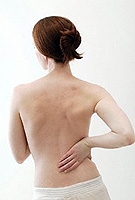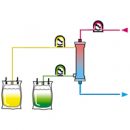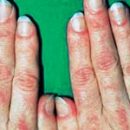Pyelonephritis - Inflammation of the kidney fabric. Pyelonephritis is more often ill: children under 7 years old who have a disease associated with anatomical features of development; Girls and women are 18-30 years old who have the appearance of pyelonephritis associated with the beginning of sexual life, with pregnancy or childbirth; Older men suffering from adenoma prostate gland.
Content
Causes of pyelonephritis
In addition to the listed, one of the most frequent causes of pyelonephritis is the urolithiasis and frequent attacks of renal colic. With all these diseases and states, the outflow of urine from the kidney is disturbed, which makes it possible to multiply in it by microorganisms. Also contribute to the development of pyelonephritis such factors as a decrease in total immunity of the body, diabetes, chronic inflammatory diseases. For its flow, pyelonephritis can be acute and chronic.
Acute pyelonephritis begins suddenly, the temperature is sharply rising to 39-40?C, weakness appear, headache, abundant sweating, nausea and vomiting. Simultaneously with the temperature appear pains in the lower back, as a rule, on the one hand. Pain wear stupid character, but there may be different intensity. If the disease develops against the background of urolithiasis, then the attack of pyelonephritis is preceded by the attack of the kidney colic. Urination with uncomplicated pyelonephritis form is not broken.
Digostic pyelonephritis
When treating a patient with pyelonephritis, blood tests, urine, as well as studies that show the overall condition of urinary tract (ultrasound, X-ray studies). The diagnosis of acute pyelonephritis is usually not difficult. In the absence of treatment, the disease either goes into a chronic form, or ingenious processes are developing - the apostatous form of pyelonephritis, abscess or kidney carbuncoon. Void processes are manifested by a deterioration in the state of the patient, sharp temperature surges (from 35-36?With the morning to 40-41?In the evening).
Treatment of pyelonephritis

Patients with acute pyelonephritis must be treated in hospital. The uncomplicated form of pyelonephritis is treated conservatively, antibacterial, disintellation and immunostimulating therapy is carried out. Treatment is carried out until microbes will completely disappear from the urine. It usually is 2-3 weeks. In force complications, the operation is shown. On operational intervention sometimes have to be resorted by urolithiasis, if the stone does not leave independently and cannot be reduced to the instrumental methods.
Chronic pyelonephritis, as a rule, is a consequence of the unrealized acute pyelonephritis, when it was possible to remove acute inflammation, but it was not possible to completely destroy all the pathogens in the kidney, nor restore the normal outflow of urine from the kidneys.
Chronic pyelonephritis can constantly disturb the patient with stupid laundry pains, especially in crude cold weather. In addition, chronic pyelonephritis is exacerbated from time to time, and then the patient appears all signs of the acute process. Treatment of chronic pyelonephritis is fundamentally the same as acute, but longer and time-consuming.
The main recommendation for pyelonephritis prevention is the treatment of the main disease, which can lead to its development, first of all - urolithiasis and prostate gland adenoma, as well as all diseases accompanied by a violation of urine outflow from the kidneys. Pregnant women, especially with multipleness, multi-way, with a large fruit and with a narrow pelvis needed at least 1 time per month to carry out bacteriological analysis of urine and the study of urodynamics.









